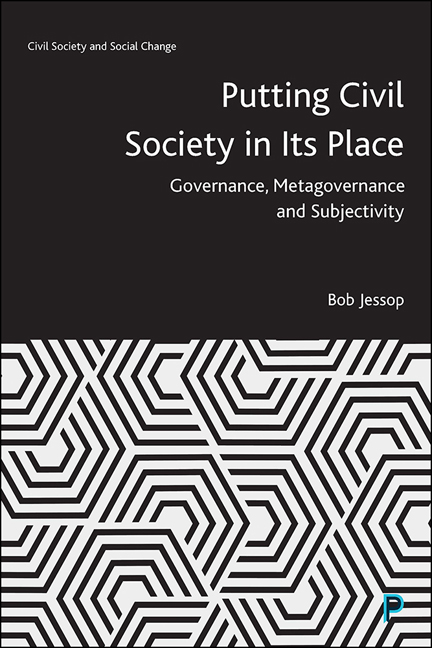Book contents
- Frontmatter
- Dedication
- Contents
- List of Tables and Figures
- Abbreviations
- Note on the Author
- Acknowledgements
- Licensing Information
- Preface
- 1 Introduction
- Part I Complexity, Contingency and Governance
- Part II Locating Civil Society as a Mode of Governance
- Part III Governance Failure and Metagovernance
- Endnotes
- References
- Index
6 - Locating Civil Society in Marx and Gramsci
Published online by Cambridge University Press: 18 March 2021
- Frontmatter
- Dedication
- Contents
- List of Tables and Figures
- Abbreviations
- Note on the Author
- Acknowledgements
- Licensing Information
- Preface
- 1 Introduction
- Part I Complexity, Contingency and Governance
- Part II Locating Civil Society as a Mode of Governance
- Part III Governance Failure and Metagovernance
- Endnotes
- References
- Index
Summary
Here I introduce the political economy of governance by sketching Marxian and Gramscian perspectives. This reflects the fact that Part I was primarily a sociological perspective in critical governance studies, that Chapter 5 presented a political and policy perspective, and that it is now time to present a radical perspective grounded in recognition of the capitalist character of the contemporary concept of civil society. This perspective was influential in Lockwood's critique of a classbased analysis as he showed the way in which citizenship played an independent role as a forcefield in civil society dynamics.
In Hegel's work civil society was presented as a bürgerliche Gesellschaft (bourgeois society) and saw its bourgeois (economic agent) character as dominant over the citoyen (citizen). For Hegel, the political consolidation of bourgeois society involves the subsumption of social struggle under an administrative form organized by the state (Neocleous, 1996: 14). Indeed, the police and corporations represent the penetration of the state into civil society, while the Estate assembly (comprising members of the Estates) represents the penetration of civil society into the state. This interpenetration of state and civil society follows from Hegel's understanding that the system of needs does not and cannot exist in a vacuum free from any ‘interference’ by public authority (Neocleous, 1996: 3).
This was criticized by Marx who saw the conflict between bourgeois and citoyen as requiring resistance to the state and by Gramsci who saw that civil society became more important in the 1870s as the masses gained the vote in their campaign for political rights. For both Marx and Gramsci, the separation between the economic and political spheres was a key feature of bourgeois societies. They argued that democracy could not be restricted to the political sphere but should also involve economic democracy. This has been called into doubt by the expansion of the world market and survival of national states.
The relevance of Marx
In introducing his 1859 Preface to the Contribution to the Critique of Political Economy, Marx wrote:
My inquiry led me to the conclusion that neither legal relations nor political forms could be comprehended whether by themselves or on the basis of a so-called general development of the human mind, but that on the contrary they originate in the material conditions of life,
- Type
- Chapter
- Information
- Putting Civil Society in Its PlaceGovernance, Metagovernance and Subjectivity, pp. 125 - 136Publisher: Bristol University PressPrint publication year: 2020



